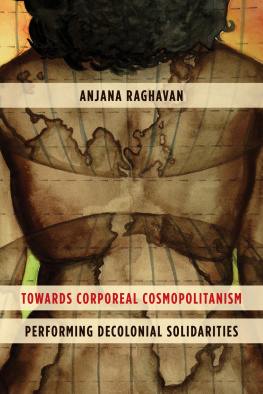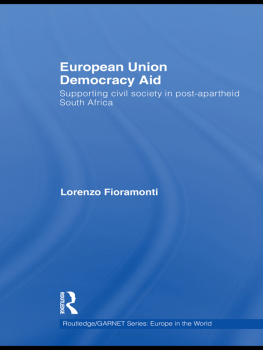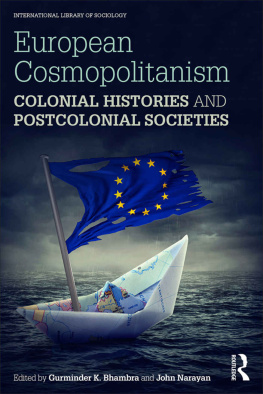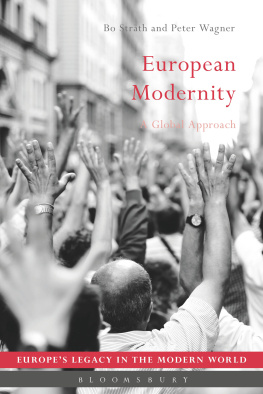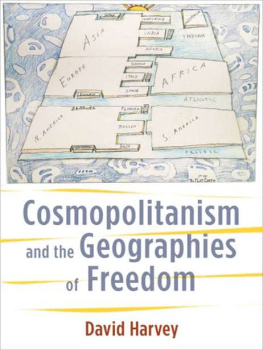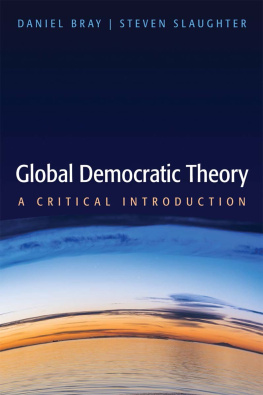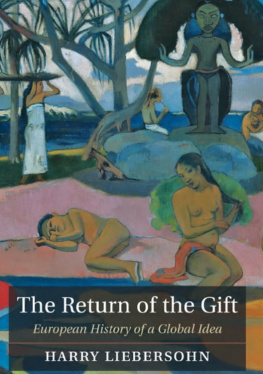ISBN 9783-11045575-5
e-ISBN (PDF) 9783-11045764-3
e-ISBN (EPUB) 9783-11045706-3
ISSN 21947104
Library of Congress Cataloging-in-Publication Data
A CIP catalog record for this book has been applied for at the Library of Congress.
Bibliographic information published by the Deutsche Nationalbibliothek
The Deutsche Nationalbibliothek lists this publication in the Deutsche Nationalbibliografie; detailed bibliographic data are available on the Internet at http://dnb.dnb.de .
2016 Walter de Gruyter GmbH, Berlin/Boston
Cover image: Old map of Suriname, 1853. By Lithograaf: Spanier, Elias (Het geheuden van Nederland) [public domain], via Wikimedia Commons.
Typesetting: PTP Protago-T E X-Production GmbH, Berlin
www.degruyter.com
Acknowledgments
While working on this book I have published portions of it in different forms. To adapt them to the final shape of argument, I have revised all of them with one exception.
is a modified version of the essay The Divided Legacy of the Republic of Letters: Emancipation and Trauma, Journal of Literature and Trauma Studies (University of Nebraska Press) 2: 1 (2012), 130.
is a modified version of the essay The Fissured Identity of Literature. The Birth of National Literary History out of International Cultural Transfers, Journal of Literary Theory (De Gruyter) 12: 7 (2013), 130.
is an extended and revised version of the essay Two Concepts of Literary Bildung: Education and/or Self-Formation? in Vladimir Biti, ed., Reexamining the National Philological Legacy: Quest for a New Paradigm? Amsterdam and New York: Rodopi, 2013, 2342.
draws on portions from The Divided Legacy of the Enlightenment: Herders Cosmopolitanism as Suppressed Eurocentrism, in Marc Maufort & Caroline de Wagter, eds., OldMarginsandNew Centers: TheEuropean Literary Heritage in the Age of Globalization , Bruxelles et al.: Peter Lang, 2011, 7383.
is an original contribution.
The argument taken in Part Two is sketched in the German-language essay Theorie und Weltbrgerlichkeit, in Mario Grizelj and Oliver Jahraus, eds., Theorietheorie: Gegen die neuerliche Theoriemdigkeit in den Geistes- und Kulturwissenschaften , Paderborn and Munich: Wilhelm Fink, 2011, 291303.
is an extended and revised version of the essay The Adulterous Theory, Neohelicon (Springer) 1: 40 (2013), 1121. This essay was published in slightly modified version, in German, under the title Die verinnerlichte Auerhalbbefindlichkeit: ber die weltbrgerliche Legitimierung der theoretischen Wahrheit, in Mario Grizelj, Oliver Jahraus and Tanja Prokic, eds., Vor der Theorie: Immersion Materialitt Intensitt , Wrzburg: Knighausen & Neumann, 2014, 163183.
is an extended and revised English version of the German-language essay Anschlussfhigkeit und postkoloniale Welt: Zum Stellenwert des Romans in Luhmanns Systemtheorie, in Grizelj, Mario and Daniela Kirschstein, eds., Riskante Kontakte: Postkoloniale Theorien und Systemtheorie? Berlin: Kadmos, 2014, 251278.
is an original contribution.
substantially extends and reworks portions taken from the essay The Self, the Novel and History: On the Limits of Bakhtins Historical Poetics, Orbis Litterarum (Blackwell&Viley) 4: 66 (2011), 255279.
substantially extends and reworks portions taken from the essay Distance and Proximity, Neohelicon (Springer) 2: 37 (2010), 469475.
substantially extends and reworks portions taken from three essays: From Literature to Culture and Back?, Primerjalna knjievnost 1: 31 (2008), 1525, Narrative Identification, Arcadia (De Gruyter) 1: 43 (2008) and Toward a Literary Community? in Theo D'haen und Iannis Goerlandt, eds., Literature for Europe , Amsterdam, New York et al.: Rodopi, 2009, 2742.
draws on the short draft of Literature as Deterritorialization: Gilles Deleuze and Jacques Rancire, in Sonja Stojmenska-Elzeser and Vladimir Martinovski, eds., Literary Dislocations , Skopje: Institute of Macedonian Literature, 2013, 1927. It was published in the given form under the title Disaggregating Territories: Literature, Emancipation, and Resistance, in Umjetnost rijeci/The Art of Words: Journal for Literature, Theatre and Film Studies 34: 58 (2014).
The epilogue was written especially for this book.
I offer my thanks to the publishers for their permission to use revised versions of these essays here.
Introduction
The Cosmopolitan Axis: Agencies and/or Enablers
Despite the latters increasing denial of the imparity underlying it, or rather because this asymmetry was so consistently obliterated, democracy reinvigorated the division between the entitled and the disqualified humans. As the imposed consensual platform of human commonality systematically gained in volume from the Renaissance onwards, the traumatic gap within this commonality grew deeper. I argue that the contribution of the modern idea of literature to the European cosmopolitan restructuration of time, space, and meaning took place in this exclusionist frame, which fissured modern literatures identity.
My thesis is that the usually celebrated cosmopolitan extension and homogenization of the political space that constitutes the gist of European modernity announces the process that is usually termed globalization today. The eighteenth and nineteenth centurys cosmopolitan projects trace the twentieth centurys global democracy, confirming the thesis that [g]lobalization is not an alternative reality that makes previous knowledge and social reality irrelevant. It is a long emerging if only recently visible and represented reality (Alexander 2012: 155). However, since the cosmopolitan compression of time, space, and meaning (157) grows out of what its promoters either denied as their individual or reclaimed as their collective trauma, the usual representation of modernization as a progress from the particular to the universal is misleading. Such simplifications belong to the European myopic self-perception and self-aggrandizing rhetorics that have to be dismantled rather than uncritically resumed. What makes them questionable is precisely the traumatic origin of cosmopolitan projects. It prevents cosmopolitanism from being a sovereign action of responsible subjects, disclosing it as an enforced reaction of the instances dispossessed by injury.
As I will try to demonstrate in what follows the pattern of trauma denial underlies, for example, Voltaires project of the Republic of Letters as well as Herders utopian vision of humanity and Goethes idea of world literature for that matter; German Romanticists, on the contrary, reclaimed the experience of a long-term national victimhood in their trauma narrative. In the former cases, we have to deal with the covert and individual trauma narratives developed from the poisonous knowledge acquired by their narrators in shattered social relationships ( It is not only that the acknowledgment of one kind of voice implies the refusal of the other, but also that this refusal tears apart the acknowledged community. This is why, under certain exceptional conditions, the agents of both the acknowledged and suppressed voices experience the parameters of action and the intelligibility of their political space as restrictive and in need of restructuring and recalibration.


